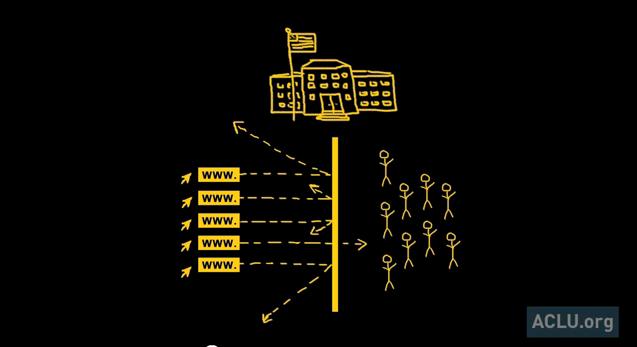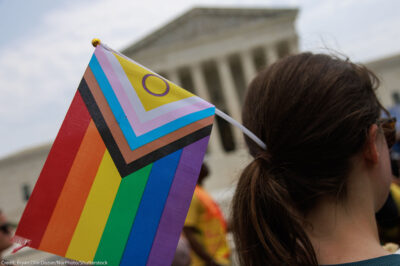
Few things shock us here at the ACLU national office, but when a student from Virginia emailed us this image a few months ago, more than one of us gasped out loud:
This was what the student saw when he tried to visit the website for the Gay, Lesbian and Straight Education Network from a computer at his school. The stop sign was bad enough to begin with, but we could hardly believe the veiled threat implied by the school’s web filtering software’s ominous warning, “Your Internet usage is monitored and logged.”

Some schools have improperly configured their web-filtering software to illegally censor LGBT-related websites such as the GSA Network and the Gay, Lesbian and Straight Education Network. At the same time that they block access to websites for positive LGBT rights organizations, those schools still allow access to anti-LGBT sites that condemn LGBT people or urge us to try to change our sexual orientation. This is called viewpoint discrimination, and it’s illegal.
Beyond being illegal, when schools block access to positive LGBT information, they block information that could be vital for troubled LGBT youth who either don’t have access to the Internet at home or don’t feel safe accessing such information on their home computers.
In 2009, we took on two school districts in Tennessee over their unconstitutional web filtering policies with Franks v. Metropolitan Board of Public Education, a lawsuit that resulted in increased access to positive LGBT information for students in dozens of school districts around the state. Because we suspect this kind of illegal censorship is being practiced in many schools across the U.S., the ACLU is teaming up with Yale Law School to launch a campaign called “Don’t Filter Me” to assess censorship of web content in public high schools. The campaign asks students to check to see if web content geared toward the LGBT communities is blocked by their schools’ web browsers. Students can report instances of censorship to the ACLU LGBT Project.
If you’re a public high school student and would like to know more about your school’s web filter, check out this video showing how to test whether your school is illegally filtering content and how to report censorship:
Please note that by playing this clip YouTube and Google will place a long-term cookie on your computer. Please see YouTube's privacy statement on their website and Google's privacy statement on theirs to learn more. To view the ACLU's privacy statement, click here.
Students who want to report unconstitutional web filtering at their schools can fill out a form at https://action.aclu.org/secure/dont-filter-me-students-check-your-schools-web-filter. More information on the ACLU’s work on LGBT school issues can be found here: https://www.aclu.org/safeschools.



